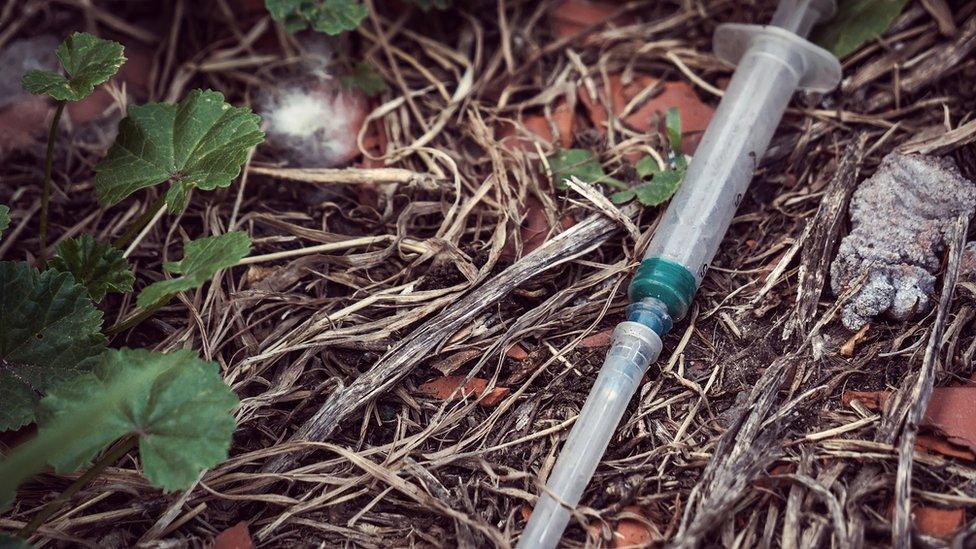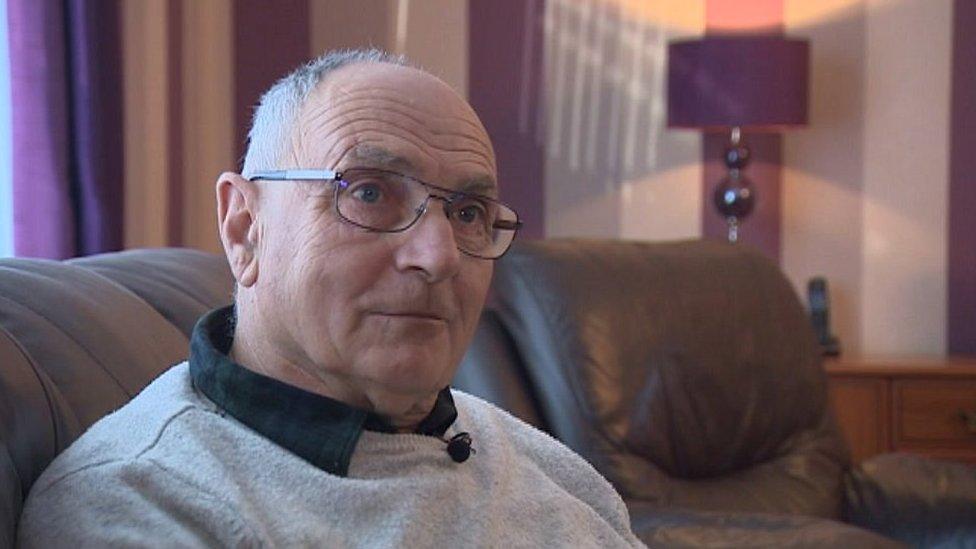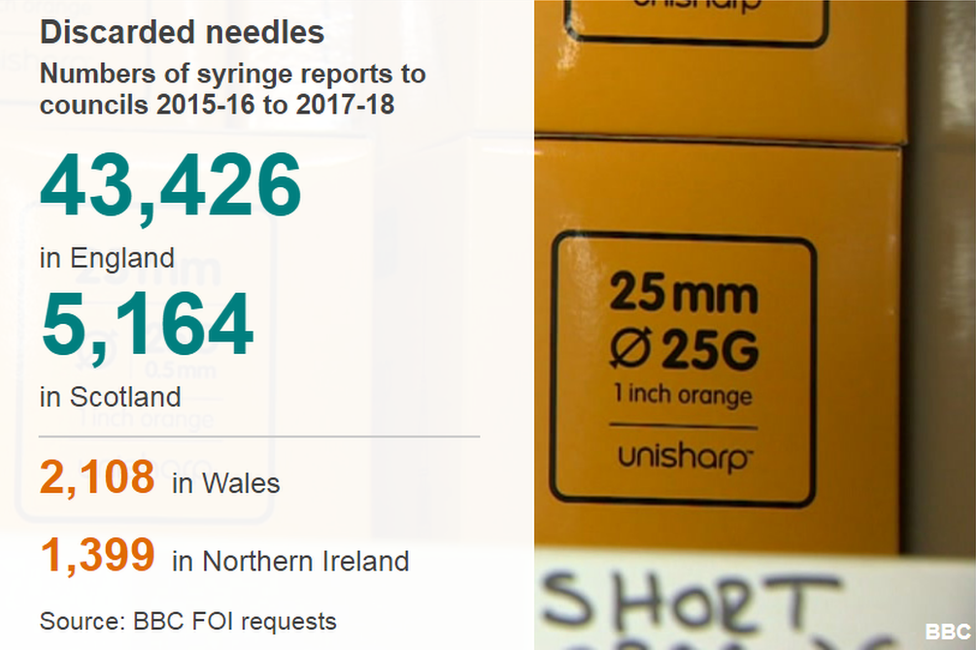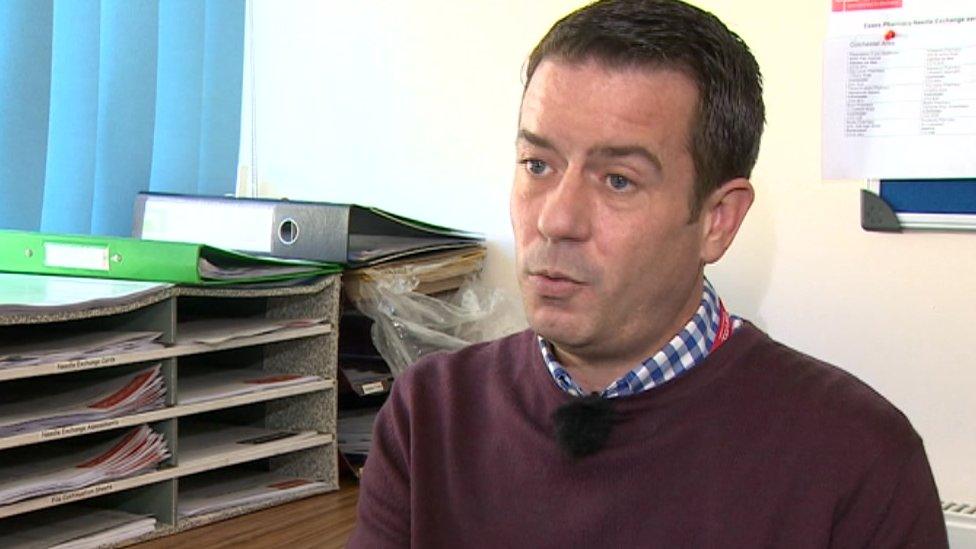Discarded needles and syringes removed up to 50 times a day
- Published

A drugs charity says councils have limited resources to help dispose of needles safely
Discarded syringes have been left in play areas and car parks as a BBC investigation found councils were being called 50 times a day to remove them.
Figures obtained by the BBC showed councils handled 18,496 cases in 2017-18, a rise of 7% in two years.
A volunteer pricked by a discarded needle has told how he faces a wait for HIV and hepatitis test results.
The Department for Communities and Local Government said it was "committed to doing more to reduce drug misuse".

Bob Harris is going through tests for HIV and Hepatitis C after he was pricked during a litter pick in Peterborough
Bob Harris, 68, is awaiting the results of tests for HIV, external and Hepatitis C, external after the incident at the Railworld Wildlife Haven in Peterborough.
He had picked up a used syringe and put it in a plastic bag for disposal. But the needle pierced through the bag.
"The bag twisted around and the needle stuck into my leg," said Mr Harris.
"I don't know whether I have caught anything through it or not.
"You've got that worrying time between when it happened and finding out whether you've caught anything."
Mr Harris said he had been warned he could be waiting months before he got the all clear.
His wife Linda said: "Of course there is always HIV in the back of your mind from these needles, but let's hope everything will be ok."

The BBC asked more than 400 local authorities in the UK how many reports they had received about discarded needles during the past three years. About 250 councils responded.
The responses showed there were 18,496 separate reports of discarded syringes in 2017-18 and more than 34,000 items collected.
They included syringes being found in car parks and alleyways near schools in Newcastle, under a climbing frame at a play park and washed up on the shore at Poole in Dorset and 880 syringes collected from a single property in Medway, Kent, during a house clearance.
However, the total numbers are likely to be significantly higher because about a third of authorities asked did not respond and some others provided only a partial response.
Figures from the authorities that did respond revealed 52,255 separate public reports of discarded syringes have been made to councils since 2015. In that time, more than 100,000 needles have been retrieved.
The highest number of requests was reported in Maidstone, where 4,495 syringe collections were lodged in three years. Maidstone Borough Council was approached about the level of reports, but has yet to respond.

Jody Leach, of Open Road, said organisations such as his provide drug users with containers so needles can be more safely disposed of
Bristol City Council told the BBC it handled 4,045 reports - the second highest number - but added its figures were for all "sex and drugs litter", which might include "condoms and canisters as well as syringes".
Release, the National Centre for Expertise on Drugs and Drug Law, said national cuts to funding meant many local authorities had very limited resources to allocate to harm reduction measures such as needle exchanges.
The organisation said: "The high number of discarded needles may also be attributed to the ongoing rise in street homelessness as more people will be injecting drugs publicly rather than at home.
Needle exchanges such as Open Road, in Colchester, Essex, are funded by both the NHS and local authorities and provide both treatment and a place to deposit used syringes.
"We've distributed nearly 300,000 needles," said Jody Leach, quality and treatment manager at Open Road. "We issue 'sharp bins' (containers) to everybody who uses the exchange and they are encouraged to return them the next time they want to use the exchange.
"Without a programme like this, that we provide, it would be very unclear what would happen to the equipment that is being used."
A government spokesman said: "We are committed to doing more to reduce drug misuse and want everyone in need to get the treatment and support they need.
"Our drug strategy aims to protect the most vulnerable and help those with a drug dependency to recover and turn their lives around.
"That's why we're giving local authorities £16bn over the next four years to provide public health services, including drug support and treatment.
"Councils have access to more than £90bn this year and next to meet the needs of their residents, and we announced extra money for them in the Budget in October."
The NHS says used syringes can put people at risk of Hepatitis B, Hepatitis C and HIV, but the National AIDS Trust said there were no reported cases of anybody acquiring HIV from a discarded syringe.
Kat Smithson, the trust's director of policy and campaigns, said: "The problem of discarded needles is a concern for many people who would like public places to be safe and pleasant, particularly for children.
"At the same time, it is important to reassure the public regarding HIV risk. HIV can be transmitted through the direct sharing of injecting drug equipment, however, HIV is a very delicate virus that does not survive outside the body well and therefore risk from a discarded needle is extremely low."